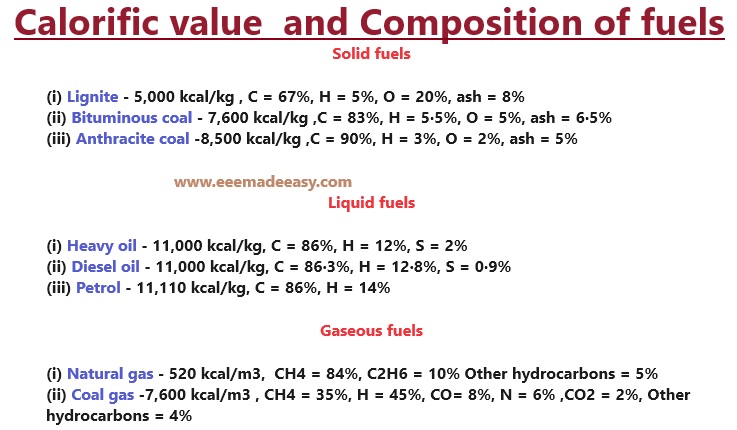Calorific Value of Fuels: The amount of heat produced by the complete combustion of a unit weight of fuel is known as its calorific value.
Calorific Value of Fuels
Calorific value indicates the amount of heat available from a fuel.
The greater the calorific value of fuel, the larger is its ability to produce heat.
Calorific value of a fuel is expressed in
In case of solid and liquid fuels, the calorific value is expressed in cal/gm or kcal/kg.
However, in case of gaseous fuels, it is generally stated in cal/litre or kcal/litre.
Calorific value and Composition of fuels
The details of various types of fuels and their calorific values along with composition isgiven below.
Solid fuels
(i) Lignite – 5,000 kcal/kg , C = 67%, H = 5%, O = 20%, ash = 8%
(ii) Bituminous coal – 7,600 kcal/kg ,C = 83%, H = 5·5%, O = 5%, ash = 6·5%
(iii) Anthracite coal -8,500 kcal/kg ,C = 90%, H = 3%, O = 2%, ash = 5%
Liquid fuels
(i) Heavy oil – 11,000 kcal/kg, C = 86%, H = 12%, S = 2%
(ii) Diesel oil – 11,000 kcal/kg, C = 86·3%, H = 12·8%, S = 0·9%
(iii) Petrol – 11,110 kcal/kg, C = 86%, H = 14%
Gaseous fuels
(i) Natural gas – 520 kcal/m3, CH4 = 84%, C2H6 = 10% Other hydrocarbons = 5%
(ii) Coal gas 7,600 kcal/m3 , CH4 = 35%, H = 45%, CO= 8%, N = 6% ,CO2 = 2%, Other hydrocarbons = 4%

Advantages of liquid fuels over the solid fuels
The following are the advantages of liquid fuels over the solid fuels
(i) The handling of liquid fuels is easier and they require less storage space.
(ii) The combustion of liquid fuels is uniform.
(iii) The solid fuels have higher percentage of moisture and consequently they burn with great
difficulty. However, liquid fuels can be burnt with a fair degree of ease and attain high
temperature very quickly compared to solid fuels.
(iv) The waste product of solid fuels is a large quantity of ash and its disposal becomes a problem.
However, liquid fuels leave no or very little ash after burning.
(v) The firing of liquid fuels can be easily controlled. This permits to meet the variation in load
demand easily.
Advantages of solid fuels over the liquid fuels
The following are the advantages of solid fuels over the liquid fuels :
(i) In case of liquid fuels, there is a danger of explosion.
(ii) Liquids fuels are costlier as compared to solid fuels.
(iii) Sometimes liquid fuels give unpleasant odours during burning.
(iv) Liquid fuels require special types of burners for burning.
(v) Liquid fuels pose problems in cold climates since the oil stored in the tanks is to be heated in order to avoid the stoppage of oil flow.
Questions on Fuels and Energy
(i) The primary source of energy is the ………………….
Ans: Sun
(ii) The most important form of energy is the …………………….
Ans: electrical energy,
(iii) 1 kWh = ………………… kcal
Ans: 860,
(iv) The calorific value of a solid fuel is expreessed in ………………….
Ans: cal/gm or kcal/kg,
(v) The three principal sources of energy used for the generation of electrical energy are …………………… and …………………….
Ans: water, fuels and radioactive substances.
(i) Electrical energy is ………………….. than other forms of energy. (cheaper, costlier)
Ans: cheaper,
(ii) The electrical, heat and mechanical energies ……………………. be expressed in the same units. (can, cannot)
Ans: can
(iii) ……………………. continue to enjoy the chief source for the generation of electrical energy.
(fuels, radioactive substances, water)
Ans: fuels
(iv) The basic unit of energy is ……………………. (Joule, watt)
Ans: Joule
(v) An alternator is a machine which converts ……………………. into ……………………..
(mechanical energy, electrical energy)
Ans: mechanical energy in to electrical energy.
Latest Posts
- Industries Extension Officer Syllabus Kerala PSC|IEO 2024 Syllabus
- [PDF]Trade Instructor Gr.II Electroplating Syllabus Kerala PSC|92/2023 syllabus
- [PDF] Syllabus Assistant Engineer Electrical Harbour Engineering Kerala PSC
- Industries Extension Officer Kerala PSC Notification|IEO 2024
- Electricity Act 2003 Section 135
- Synchronous Motor Advantages, Disadvantages & Applications
- [Latest]Assistant Director industries and commerce Kerala PSC syllabus|630/2023 syllabus






